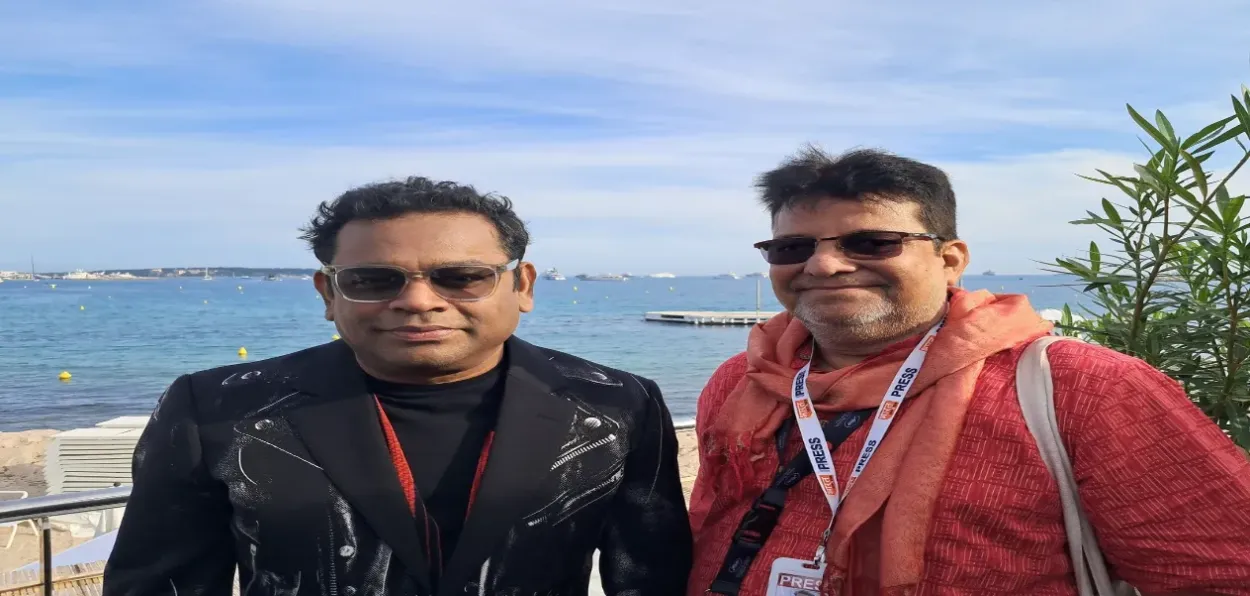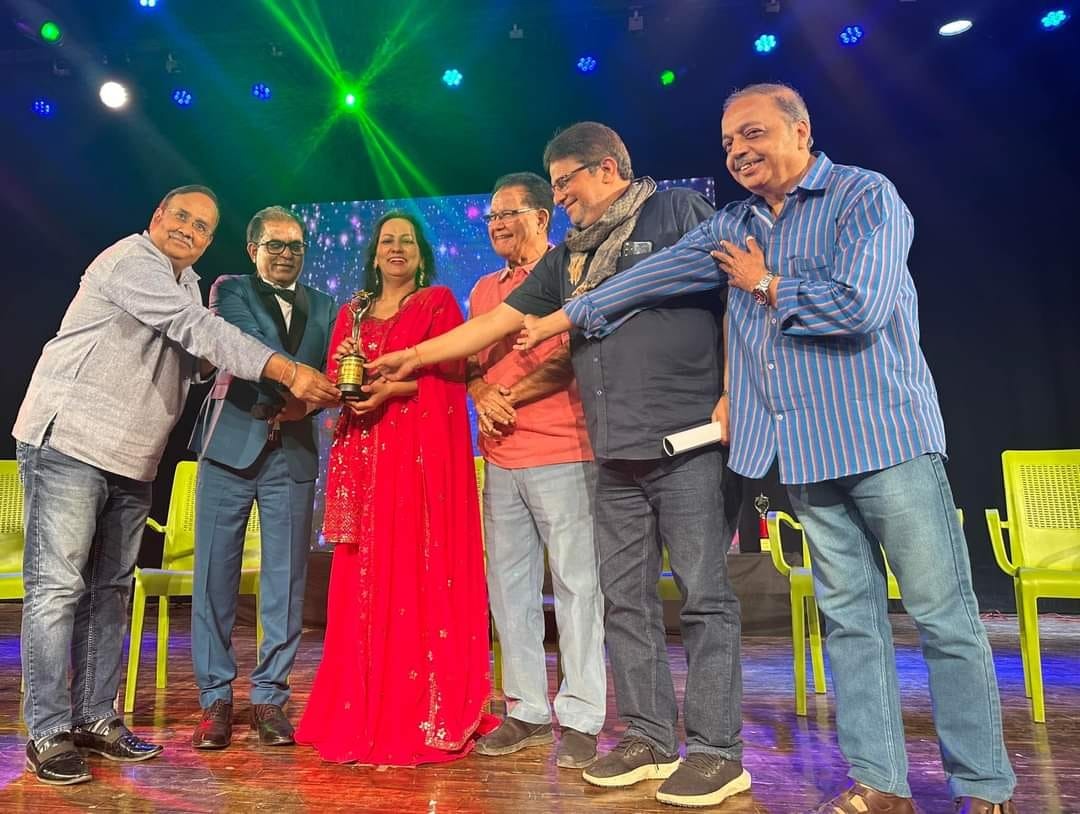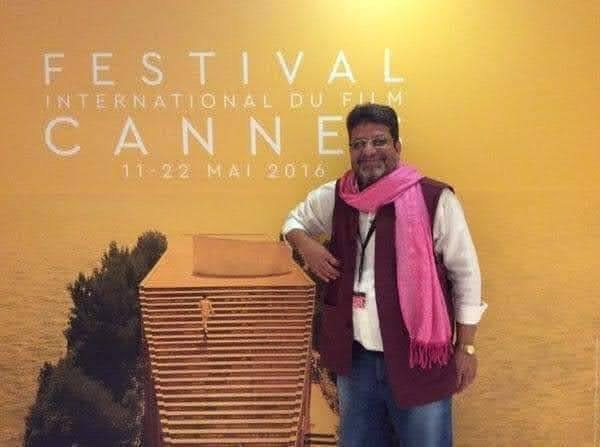
Manjit Thakur
Two decades ago, I was in Goa to cover the International Film Festival of India for DD News. It was my first visit to Goa. Goa was the first venue in India to be selected as a permanent venue for the International Film Festival, as against such festivals being held in different cities.
Obituary
It's there while struggling to cover the event for Doordarshan. I met many veteran journalists covering cinema, and one of them was a friendly, cheerful, jovial Ajit Rai.
Over the years, to me, Ajit Rai came across as one of the most vocal journalists standing at the forefront of cultural journalism. Be it cinema or theatre, his coverage was always comprehensive; his stories had personality, much like him.
To the young journalists, for whom cinema meant merely the colourful news of Bollywood films and personalities, Ajit Rai (and some other old journalists like him) explained the profound meaning of cinema.

Ajit Rai (second from right) at a Film show
I gained exposure to world cinema at the Film and Television Institute of India (FTII), but Ajit Rai broadened our horizons by discussing Iranian, Turkish, Russian, Cuban, Argentine cinema, etc.
In Goa's coconut groove, and amidst the sound of the sea waves, the spacious lawn near the Kala Akademi canteen, Ajit Rai would be found discussing cinema with mediapersons. He was a crowd puller mainly because of his knowledge and gentle demeanor.
Earlier this month, his book 'Bollywood and Hindujas' was released by actor Akshay Kumar in London. On his return to Delhi, he told me that he plans to write more books.
Invariably, whenever he touched Delhi, he would call and ask, "Can we meet?" Realising my busy office schedule, he would offer to come to the roadside tea stall near my office.

Ajit Rai at Cannes Film Festival
He enjoyed his cup of tea on the roadside while we chatted. Seeing him there, nobody could even believe that he had just returned from Saudi Arabia in a chartered plane where he was invited by the Crown Prince MBS as a jury member of the Red Sea Film Festival.
Or that he was helping in the management of the Russian Film Festival, had covered the Al Gouna Film Festival held in Cairo.
Ajit Rai's favourite place was Cannes. He used to write Cannes Diary regularly for our website.
He played a pivotal role in launching the Azamgarh Film Festival, Raipur Film Festival, and Haryana International Film Festivals. In 2012, when Bollywood celebrated the centenary year of the Indian film industry, Ajit Rai organized a film festival on farmers in October.
 Ajit Rai was not just a serious critic who was unhappy with the Mumbai film industry or a film journalist who took selfies with big stars. In many meetings, he would rue that India didn't have good film critics.
Ajit Rai was not just a serious critic who was unhappy with the Mumbai film industry or a film journalist who took selfies with big stars. In many meetings, he would rue that India didn't have good film critics.
He felt that the movement for good Hindi cinema was over, and the Hindi society and academic world had stopped considering cinema as a serious medium.
Ajit Rai reached cinema through the progressive Hindi literature and theatre, but he accepted with an open heart the emotional anarchy of Hindi cinema and the free thinking and modernity of world cinema.
He was one of the few people in Hindi film journalism who did not set a political agenda while writing on cinema. He introduced the Hindi-speaking society, bound by traditions and taboos, to the parallel grammar of world cinema and its independent perspective.
Rai used to compare the impact of cinema on Indian society with that of Western countries. Serious discussions on art of cinema are a regular feature in Italy, France, and Germany. However, nothing of that sort happens in India, especially in Hindi cinema.
He felt that Bollywood was not representative of Indian cinema. Without good film festivals and movements, we cannot expect good films.
It's hard to summarise Ajit Rai's achievements. Whether it was doing cultural reporting in a reputed magazine like Hans, writing columns like Rethghadi, being a member of the media committee of the International Film Festival of India, or achieving the status of being a leading film critic of India, a cultural journalist who has extensive and vast experience of writing and publishing on literature, theatre, cinema and intellectual discourse in almost all the major national newspapers and reputed magazines... Ajit Rai was not just this.
His nearly 3,000 published articles, reports, reviews, interviews, and cover stories are, perhaps, enough to establish him as a leading journalist in cultural journalism.
He was also associated with Jansatta and The Indian Express and was also the guest editor of the prestigious magazine 'Rang Prasanga' of the National School of Drama. When Tripurari Sharan became the Director General of Doordarshan, he started a magazine Drishyantar with Ajit Rai as its editor.
He wrote a wonderful book on the contribution of the Hinduja brothers over the last seven decades in making Hindustani cinema, especially Hindi cinema, popular across the world: Bollywood Ki Buniyaad.
ALSO READ: Cannes Film Festival takes off with impressive Indian presence
He has just started to document his experiences and travels in books. The journey would start from Gaya, Bihar, where he was born to various parts of the world, including Cannes.
Alas, it was not to happen, for Ajit Rai suddenly passed away in London on 23 July.
Such a sudden loss of knowledge and experience creates a void which is hard to be filled.
(The author is Editor, Audio-Visual, Awaz-The Voice)
